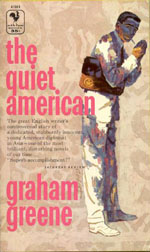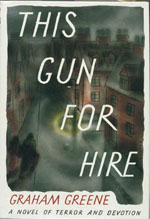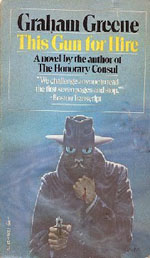- Welcome
- Noir Zine
- Allan Guthrie
- Books
"...those who enjoy the darker side of the genre are in for some serious thrills with this..."
Laura Wilson, The Guardian

Published in the UK by Polygon (March 19th, '09) and in the US by Houghton Mifflin Harcourt (Nov '09).
graham greene's noir
by Patrick J. Lambe
"God save us always from the innocent and the good." Graham Greene.
 In noir fiction good is rarely encountered, innocence non-existent or quickly squashed, and God—if present at all—is not interested in saving anyone. Yet this quote by Graham Greene pretty much summarizes noir. The innocent and good are, well, boring. Unless their innocence is being corrupted or their supposed good is hurting someone.
In noir fiction good is rarely encountered, innocence non-existent or quickly squashed, and God—if present at all—is not interested in saving anyone. Yet this quote by Graham Greene pretty much summarizes noir. The innocent and good are, well, boring. Unless their innocence is being corrupted or their supposed good is hurting someone.
The protagonists of Greene’s three noir novels, Pyle (The Quite American), Pinkie (Brighton Rock) and Raven (This Gun for Hire), are all the very picture of innocence. Each is a virgin, at least through most of their respective stories. Yet their twisted innocence causes almost as much trouble as the first time a virgin unleashed something good into an unsuspecting world, 2000 years ago in Jerusalem. Fowler thinks about Pyle, "What’s the good? he’ll always be innocent, you can’t blame the innocent, they are always guiltless. All you can do is control them or eliminate them. Innocence is a kind of insanity."
Pyle, the eponymous Quiet American, looks with nostalgic homesickness at a milk bar across the street from the Continental Hotel bar in Saigon and says "That looks like a soda fountain". Fowler, the older English journalist who befriends him, thinks, "I wondered what depth of homesickness lay behind his odd choice of what to observe in a scene so unfamiliar." Here it is laid out: American innocence; European cynicism. Of course, innocence is the cause of true evil; munitions supplied by Pyle to his beloved ‘third force’ blow up the square dividing the milk bar and the hotel bar. The way we deal with homesickness from our side of the pond is to turn the entire world into our home. Oh we’re generally pretty subtle about it, but not always. And our intentions are always good.
Another theme that runs through noir is one of alienation. Pyle and Fowler are, by their ex-patriot status, both alienated from their own countries. Additionally Fowler is seeking a divorce from his wife, and on the verge of losing his assignment. Raven’s harelip is the cause of his alienation from his fellow man. His harelip is such a defining characteristic that when a police officer asks his landlord what Raven is like, the answer is, "A harelip." Raven is even alienated by the alienated. He is betrayed by a quack doctor who was going to fix his harelip. "These people were of his own kind; they didn’t belong inside the legal borders; for the second time in one day he had been betrayed by the lawless." Pinkie, the one I find most disturbing, is alienated by the sexual contradictions of his Catholic upbringing and the combined experiences of being forced to witness his parents lovemaking every Saturday night and marry a woman who repulses him, so she can’t testify against him.
One of the things I like best about noir is the snappy dialogue, the cynical attitude displayed in brilliant, almost throwaway, lines. I sometimes think the reason I choose to write noir books is so I can get down on paper all the lines I think of minutes or hours after I should have said them in real life.
 John Lehman says in his 1956 review of The Quiet American, "I also regret a rather obtrusive element of monotony in his style, the almost unvarying tight-lipped, curtness of dialogue and comment; a mannerism which seems to me to be carried so far at times that it recalls the American school of tough thriller-writers, and would indeed be more in keeping with their quite differently aimed productions: a curious irony in a so ironically anti-American book." Greene was a master of this type of writing. Examples abound in all three of his noir books.
John Lehman says in his 1956 review of The Quiet American, "I also regret a rather obtrusive element of monotony in his style, the almost unvarying tight-lipped, curtness of dialogue and comment; a mannerism which seems to me to be carried so far at times that it recalls the American school of tough thriller-writers, and would indeed be more in keeping with their quite differently aimed productions: a curious irony in a so ironically anti-American book." Greene was a master of this type of writing. Examples abound in all three of his noir books.
Fowler asks Vigot if he is really looking into the people who killed Pyle and Vigot answers, "no I’m just making a report, that is all.’ Vigot ‘cannot afford to find anything damaging against an ally". Pyle asks Fowler, "do you think they have any reliable mechanics" and Fowler replies, "They know how to turn your exhaust pipe into a mortar, I believe Buicks make the best mortars." Fowler is lying in pain after he falls from a tower and he thinks, "I didn’t think about the Viets who would soon be searching the ruin of the tower: another shell exploded on it – they were making quite sure before they came in. What a lot of money it costs, I thought as the pain receded, to kill a few human beings – you can kill horses so much cheaper." Fowler says to Vigot, "after all, you know I didn’t kill Pyle," and Vigot responds, "I know you were not present at his murder."
The minister who Raven is sent to kill by Sir Marcus (a character I believe is the template for Monty Burns of the Simpsons) is described as, "an old, rather grubby man without any friends, who was said to love humanity." Ackay "belonged to a different class altogether: a good school and a theological college had formed his accent; something else had broken his nose." Sir Marcus is "too old to laugh, to use his lungs wastefully."
Young men arrive at the Cosmopolitan in Brighton Beach "in huge motoring coats accompanied by small tinted creatures, who rang like expensive glass when they were touched but who conveyed an impression of being as sharp and tough as tin." A corrupt cop says to Pinkie, "I don’t mind you carving each other up in a quiet way, I don’t give a penny for your worthless skins, but when two mobs start scrapping people who matter may get hurt." Pinkie thinks of his soon-to-be wife: "She was like a table or a chair, but a table owned you too – by your finger-prints." Pinkie runs into a boy from his school working as a waiter who, "returned with the brandies and brought, sidelong and scared and cautious, a whole smoky childhood with him."
Terill Lankford once said hard-boiled is about tough guys who win and noir is about tough guys who lose. George Grella, in his essay, ‘Murder and the Mean Streets’ states, "this loss of a friend, a girl, a colleague, intensifies the private eye’s (noir protagonist’s, my insert) essential loneliness. His successful investigation becomes a kind of defeat." Of course the successful investigator in two of these works, Anne of This Gun for Hire, and Ida of Brighton Rock are women, but the outcome is the same.
At the end of The Quiet American Fowler is thinking about Pyle’s fate: "Everything had gone right with me since he had died, but how I wished there existed someone to whom I could say that I was sorry." Graham Green was profoundly Catholic. His creation, Fowler is not. It never occurs to him to consult a priest. A priest is obliged to forgive a man in the eyes of God, but the obligation ends there. A priest acts as a sinner’s mouthpiece towards God, but like a lawyer, he sometimes has to know his client is guilty, and although a higher authority of a court or God is obliged to forgive, man is under no such obligation. How can Fowler forgive himself for killing someone who has saved his life? Of course Fowler didn’t kill Pyle, he found it more convenient to set him up for reasons that are as ambiguous as they are varied. Pyle’s death may serve the greater good, but it also serves Fowler’s own ambitions. Fowler gets his young Annamite girlfriend back, he slows down the shipment of arms ravaging a country he loved, but in the end I don’t see him as a hardboiled protagonist because, in a very Catholic way, he doesn’t win; God may forgive him but he will never forgive himself.
 Anne, the heroine of This Gun for Hire manages to stave off WW II for a couple of years, but she can see that this is a temporary victory. "This darkening land, flowing backwards down the line, was safe for a few more years. He was a countryman, and he didn’t ask for more than a few years’ safety at a time for something he so dearly loved." Anne says to her fiancé ,"all the same," as Raven covers her with his sack, as Raven touches her icy hand, "I failed."
Anne, the heroine of This Gun for Hire manages to stave off WW II for a couple of years, but she can see that this is a temporary victory. "This darkening land, flowing backwards down the line, was safe for a few more years. He was a countryman, and he didn’t ask for more than a few years’ safety at a time for something he so dearly loved." Anne says to her fiancé ,"all the same," as Raven covers her with his sack, as Raven touches her icy hand, "I failed."
In Brighton Rock the priest says to Rose, in confessional, "if he loved you, surely that shows there was some good…" She replies, "even love like that?" Ida seems to be a more hardboiled heroin than a noir one. She saves Rose from killing herself, outwits Pinkie, who throws himself off a cliff, and she doesn’t feel a bit of remorse. She feels great about saving Rose: "Somebody else would have been dead if we hadn’t turned up." But the victory may be the most noir of the three. She’s never going to witness the impact of the recording Pinkie gave to Rose with the assurance that he put something loving on it. "God damn you, you little bitch why can’t you go back home for ever and let me be?"
 My paperback copy of This Gun for Hire was printed in 1975, and if you look at the cover, you’d probably assume I purchased it in the Science Fiction section of the used bookstore. It features a cat-like humanoid with a fedora on its head, pointing an automatic at the reader, whilst a surprisingly human hand with a stigmata mark clutches the collar of an overcoat. The blurb on back says the novel is "A SINISTER EXCITEMENT OF DESPERATE ADVENTURES…." The pages are red on their ends—the part of the book that is visible when it is closed—and yellow on the reading surface, reminding me of a vaguely remembered joke about Chinese Communists. It is a throwback to an earlier day of pulp fiction.
My paperback copy of This Gun for Hire was printed in 1975, and if you look at the cover, you’d probably assume I purchased it in the Science Fiction section of the used bookstore. It features a cat-like humanoid with a fedora on its head, pointing an automatic at the reader, whilst a surprisingly human hand with a stigmata mark clutches the collar of an overcoat. The blurb on back says the novel is "A SINISTER EXCITEMENT OF DESPERATE ADVENTURES…." The pages are red on their ends—the part of the book that is visible when it is closed—and yellow on the reading surface, reminding me of a vaguely remembered joke about Chinese Communists. It is a throwback to an earlier day of pulp fiction.
Greene made a distinction among his novels, calling some 'entertainments' to distinguish them from his more serious work. These are the books that can be described as noir. I can’t see anything more serious than the mechanics of noir and the engine that drives it: murder. And there’s something unsettling about calling books about murder entertainments. But I guess they must be, or we wouldn’t be reading them.
Copyright© 2004 Pat Lambe
***
Bibliography
Grella, George, ‘Murder and the Mean Streets: The Hard Boiled Detective Novel’, in Detective Fiction Crime and Compromise, Dick Allen and David Chacko, Harcourt Brace Jovanocich, Inc., 1974.
Lehman, John, ‘The Blundering, Ineffectual American’, The New Republic, 1956.
Read an extract from Carlisle's Marker by Pat Lambe
PATRICK J. LAMBE lives in the wonderfully corrupt state of New Jersey where he works as a telephone technician and writes crime fiction. He is also an artist whose work has appeared in numerous art shows. He just had an innovative idea: if you can have a casting couch for the movies, why not books? Like most of his innovative ideas he’ll probably forget about this one when he sobers up.
Contact Patrick
